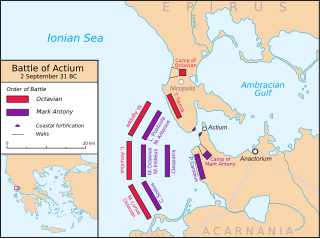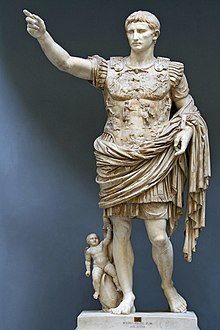
Gaius Julius Caesar Augustus, also known as Octavian, was the founder of the Roman Empire. He reigned as the first Roman emperor from 27 BC until his death in AD 14. The reign of Augustus initiated an imperial cult, as well as an era of imperial peace in which the Roman world was largely free of armed conflict. The Principate system of government was established during his reign and lasted until the Crisis of the Third Century.

Year 31 BC was either a common year starting on Tuesday, Wednesday or Thursday or a leap year starting on Tuesday or Wednesday of the Julian calendar and a common year starting on Tuesday of the Proleptic Julian calendar. At the time, it was known as the Year of the Consulship of Antonius and Caesar or as Caesar and Messalla. The denomination 31 BC for this year has been used since the early medieval period, when the Anno Domini calendar era became the prevalent method in Europe for naming years.
Year 23 BC was either a common year starting on Saturday or Sunday or a leap year starting on Friday, Saturday or Sunday of the Julian calendar and a common year starting on Friday of the Proleptic Julian calendar. At the time, it was known as the Year of the Consulship of Augustus and Varro. The denomination 23 BC for this year has been used since the early medieval period, when the Anno Domini calendar era became the prevalent method in Europe for naming years.
Year 12 BC was either a common year starting on Saturday, Sunday or Monday or a leap year starting on Sunday of the Julian calendar and a common year starting on Friday of the Proleptic Julian calendar. At the time, it was known as the Year of the Consulship of Messalla and Quirinius. The denomination 12 BC for this year has been used since the early medieval period, when the Anno Domini calendar era became the prevalent method in Europe for naming years.

The 1st century BC, also known as the last century BC and the last century BCE, started on the first day of 100 BC and ended on the last day of 1 BC. The AD/BC notation does not use a year zero; however, astronomical year numbering does use a zero, as well as a minus sign, so "2 BC" is equal to "year –1". 1st century AD follows.
This article concerns the period 39 BC – 30 BC.
Year 43 BC was either a common year starting on Sunday, Monday or Tuesday or a leap year starting on Sunday or Monday of the Julian calendar and a common year starting on Monday of the Proleptic Julian calendar. At the time, it was known as the Year of the Consulship of Pansa and Hirtius. The denomination 43 BC for this year has been used since the early medieval period, when the Anno Domini calendar era became the prevalent method in Europe for naming years.
AD 4 was a common year starting on Wednesday or a leap year starting on Tuesday of the Julian calendar and a leap year starting on Tuesday of the Proleptic Julian calendar. In the Roman Empire, it was known as the Year of the Consulship of Catus and Saturninus. The denomination "AD 4" for this year has been used since the early medieval period, when the Anno Domini calendar era became the prevalent method in Europe for naming years.

Year 44 BC was either a common year starting on Sunday, common year starting on Monday, leap year starting on Friday, or leap year starting on Saturday. and a common year starting on Sunday of the Proleptic Julian calendar. At the time, it was known as the Year of the Consulship of Julius Caesar V and Marc Antony. The denomination 44 BC for this year has been used since the early medieval period, when the Anno Domini calendar era became the prevalent method in Europe for naming years.
This article concerns the period 29 BC – 20 BC.
Year 38 BC was either a common year starting on Sunday or Monday or a leap year starting on Saturday, Sunday or Monday of the Julian calendar and a common year starting on Sunday of the Proleptic Julian calendar. At the time, it was known as the Year of the Consulship of Pulcher and Flaccus. The denomination 38 BC for this year has been used since the early medieval period, when the Anno Domini calendar era became the prevalent method in Europe for naming years. It was also the first year of the Spanish era calendar in use in Hispania until the 15th century.
Year 37 BC was either a common year starting on Monday, Tuesday or Wednesday or a leap year starting on Monday or Tuesday of the Julian calendar and a leap year starting on Monday of the Proleptic Julian calendar. At the time, it was known as the Year of the Consulship of Agrippa and Gallus. The denomination 37 BC for this year has been used since the early medieval period, when the Anno Domini calendar era became the prevalent method in Europe for naming years.
Year 36 BC was either a common year starting on Tuesday, Wednesday or Thursday or a leap year starting on Wednesday of the Julian calendar and a common year starting on Wednesday of the Proleptic Julian calendar. At the time, it was known as the Year of the Consulship of Poplicola and Nerva. The denomination 36 BC for this year has been used since the early medieval period, when the Anno Domini calendar era became the prevalent method in Europe for naming years.
Year 33 BC was either a common year starting on Saturday, Sunday or Monday or a leap year starting on Sunday of the Julian calendar and a leap year starting on Saturday of the Proleptic Julian calendar. At the time, it was known as the Year of the Consulship of Octavian and Tullus. The denomination 33 BC for this year has been used since the early medieval period, when the Anno Domini calendar era became the prevalent method in Europe for naming years.
Year 30 BC was either a common year starting on Wednesday, Thursday or Friday or a leap year starting on Thursday of the Julian calendar and a common year starting on Wednesday of the Proleptic Julian calendar. At the time, it was known as the Year of the Consulship of Octavian and Crassus. The denomination 30 BC for this year has been used since the early medieval period, when the Anno Domini calendar era became the prevalent method in Europe for naming years.
Year 28 BC was either a common year starting on Saturday, Sunday or Monday or a leap year starting on Saturday or Sunday of the Julian calendar and a common year starting on Saturday of the Proleptic Julian calendar. At the time, it was known as the Year of the First Consulship of Octavian and Agrippa. The denomination 28 BC for this year has been used since the early medieval period, when the Anno Domini calendar era became the prevalent method in Europe for naming years.
Year 29 BC was either a common year starting on Friday or Saturday or a leap year starting on Thursday, Friday or Saturday of the Julian calendar and a leap year starting on Thursday of the Proleptic Julian calendar. At the time, it was known as the Year of the Consulship of Octavian and Appuleius. The denomination 29 BC for this year has been used since the early medieval period, when the Anno Domini calendar era became the prevalent method in Europe for naming years.

Year 17 BC was either a common year starting on Sunday or Monday or a leap year starting on Saturday, Sunday or Monday of the Julian calendar and a leap year starting on Friday of the Proleptic Julian calendar. At the time, it was known as the Year of the Consulship of Furnius and Silanus. The denomination 17 BC for this year has been used since the early medieval period, when the Anno Domini calendar era became the prevalent method in Europe for naming years.
AD 2 (II) or 2 AD was a common year starting on Sunday or Monday of the Julian calendar and a common year starting on Sunday of the proleptic Julian calendar. In the Roman Empire, it was known as the Year of the Consulship of Vinicius and Varus, named after Roman consuls Publius Vinicius and Alfenus Varus, and less frequently, as year 755 AUC within the Roman Empire. The denomination "AD 2" for this year has been used since the early medieval period, when the Anno Domini calendar era became the prevalent method in Europe for naming years.
Gnaeus Calpurnius Piso was a high ranking Roman aristocrat and senator. He was firmly traditionalist and opposed the populist First Triumvirate, and later Julius Caesar. He fought against Caesar in Caesar's civil war and against his adopted son, Octavian, in the Liberators' civil war; both times on the losing side.





